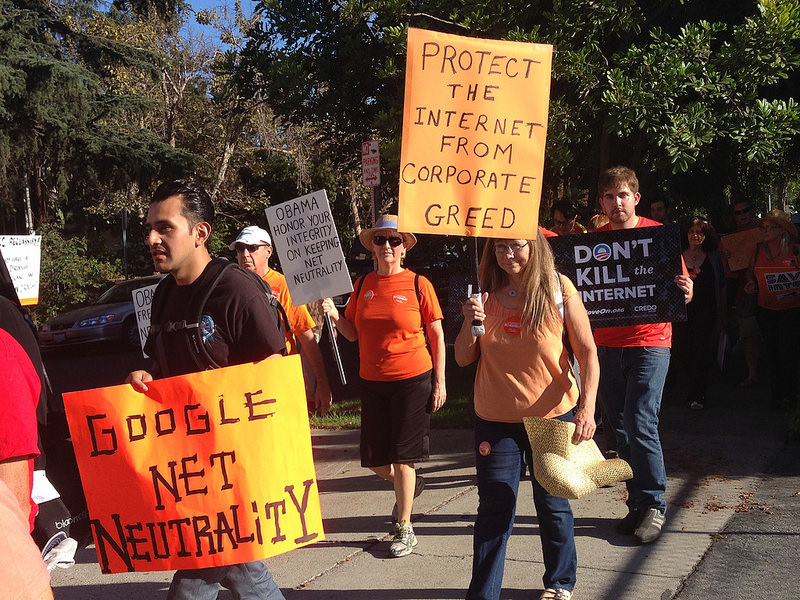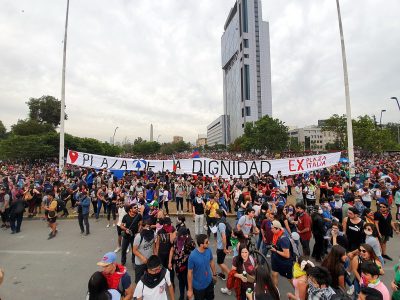Ellery Roberts Biddle, Hae-in Lim, Bojan Perkov, and Sarah Myers West contributed to this report.
Global Voices Advocacy’s Netizen Report offers an international snapshot of challenges, victories, and emerging trends in Internet rights around the world. We begin this report with a look at policy making on network neutrality in Argentina and the United States.
Argentina’s Congress is preparing to review the Argentina Digital Bill, a broad-based law intended to address various online content issues including copyright and net neutrality. Although the bill was originally regarded as a positive step toward protecting net neutrality, the current language simply “guarantees net neutrality”—a stipulation far too vague to ensure that Internet service providers will actually treat all online content and traffic equally. Global Voices contributor and Buenos Aires-based legal scholar Eduardo Bertoni told the Buenos Aires Herald, “[T]o say the country ‘guarantees’ net neutrality without saying what they understand by that is a serious legislative deficiency.”
Meanwhile in the United States, President Barack Obama called on the Federal Communications Commission to “answer the call of almost 4 million public comments, and implement the strongest possible rules to protect net neutrality” by classifying Internet service providers as a public utility, similar to electricity or telephone service.
According to the New York Times, Obama’s proposal “would allow the [Commission] to write rules that would forbid blocking of legal content and discrimination by a broadband company against any provider of content.” The solution would not however prevent Internet service providers from charging a content company for “preferred service”.
Commission Chairman Thomas Wheeler has said he is open to considering this option, but significant questions remain about the implementation of Obama’s plan.
Nigeria joins the worldwide cybercrime law craze
Senators in Nigeria approved a new cybercrime law that criminalizes identity theft, child pornography possession, and various forms of online fraud, among other activities. Written in an effort to raise meet international standards and encourage foreign investment in the country, the law also punishes Internet cafe owners who “knowingly allow their premises to be used for committing a crime.” Violators will face a minimum prison sentence of seven years or a fine of seven million Nigerian naira (approximately US$350,000). As with many laws intended to reduce online crime, critics fear the policy could be abused to punish online activists. The bill awaits approval from the House of Representatives and may be amended before it reaches President Goodluck Jonathan for final sign-off.
WireLurking, rerouting and Internet insecurity in China
Apple users in China were targeted by a malware campaign called WireLurker, which infected over 400 applications designed for OSX that were downloaded 356,104 times before being discovered by Palo Alto Networks. The malware seeks out a USB connection to an iOS device, and, after infecting it, allows the software creator to steal the victim’s address book and read their text messages. Furthermore, the malware is in contact with the attackers’ command and control center and is being actively updated. Apple has since blocked the apps being used by the platform to prevent them from launching.
Russia’s domestic Internet traffic was repeatedly rerouted to servers operated by China Telecom this week for unclear reasons. While it is possible that the change in routes was a simple mistake, it may have rendered the traffic vulnerable to interception.
The Tor crackdown in the US
Seventeen people were arrested and 414 .onion domains were seized by the FBI in a major crackdown on black market websites operating over the Tor anonymity network, including the Silk Road 2, Cloud 9, and Hydra. It remains unclear what vulnerabilities law enforcement authorities exploited in order to seize the domains. Foreign Policy magazine speculates American and European authorities may be overplaying their ability to break Tor in order to prevent others from using it, while the Tor Project has offered possible scenarios through which the authorities may have located the hidden services. Either way, the raid raises serious concerns about the preservation of anonymity and security online.
Surveillance is a “highly intrusive act,” say Germany and Brazil
Germany and Brazil are calling for changes to a United Nations draft resolution on state surveillance that would define metadata collection as a “highly intrusive act.” A vote on the draft will take place in the U.N. General Assembly’s Third Committee, which deals with human rights, later this month before proceeding to the resolution stage in December.
Facebook and AOL release new transparency reports
In their latest transparency report, Facebook says that the number of government requests for user data has increased by 24 percent in the first six months of 2014 when compared to the last half of 2013. During the first six months of this year, governments around the world made almost 35,000 requests, while the amount of content removed from the site pursuant to local laws increased by about 19 percent. “As we’ve said before, we scrutinize every government request we receive for legal sufficiency under our terms and the strict letter of the law, and push back hard when we find deficiencies or are served with overly broad requests,” the company said.
AOL also issued its transparency report for the first half of 2014. The company received 1,522 requests for user data, affecting 3,922 accounts.
Rough Consensus or “UN Security Council of the Internet”?
The Internet Corporation for Assigned Names and Numbers, the World Economic Forum, and CGI.br announced the launch of the NetMundial Initiative this week, a new group that aims to find solutions to Internet governance issues through crowd-sourcing and crowd-funding initiatives. The initiative will be run by a 25-member coordination council that will make decisions based on rough consensus. Spearheaded by ICANN, the initiative has received criticism from members of the Internet community due to a lack of transparency around the organization’s development, and has been called the “U.N. Security Council of the Internet.”
Cool Things
Enterprising artist Carla Gannis re-created Hieronymous Bosch’s 1505 masterpiece painting “The Garden of Earthly Delights” using emoji.
New Research
- Out of the Shadows, Into the Streets – Sasha Costanza-Chock
- Communities @ Risk: Targeted Digital Threats Against Civil Society – Citizen Lab




